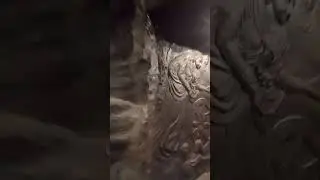Nanoscience | Wikipedia audio article
This is an audio version of the Wikipedia Article:
https://en.wikipedia.org/wiki/Nanotec...
00:02:59 1 Origins
00:07:26 2 Fundamental concepts
00:10:08 2.1 Larger to smaller: a materials perspective
00:12:13 2.2 Simple to complex: a molecular perspective
00:14:18 2.3 Molecular nanotechnology: a long-term view
00:17:50 3 Current research
00:17:59 3.1 Nanomaterials
00:19:28 3.2 Bottom-up approaches
00:20:52 3.3 Top-down approaches
00:22:28 3.4 Functional approaches
00:23:16 3.5 Biomimetic approaches
00:23:55 3.6 Speculative
00:26:28 3.7 Dimensionality in nanomaterials
00:27:20 4 Tools and techniques
00:31:45 5 Applications
00:36:03 6 Implications
00:38:32 6.1 Health and environmental concerns
00:40:26 7 Regulation
Listening is a more natural way of learning, when compared to reading. Written language only began at around 3200 BC, but spoken language has existed long ago.
Learning by listening is a great way to:
increases imagination and understanding
improves your listening skills
improves your own spoken accent
learn while on the move
reduce eye strain
Now learn the vast amount of general knowledge available on Wikipedia through audio (audio article). You could even learn subconsciously by playing the audio while you are sleeping! If you are planning to listen a lot, you could try using a bone conduction headphone, or a standard speaker instead of an earphone.
Listen on Google Assistant through Extra Audio:
https://assistant.google.com/services...
Other Wikipedia audio articles at:
https://www.youtube.com/results?searc...
Upload your own Wikipedia articles through:
https://github.com/nodef/wikipedia-tts
Speaking Rate: 0.9092032169744783
Voice name: en-US-Wavenet-F
"I cannot teach anybody anything, I can only make them think."
Socrates
SUMMARY
=======
Nanotechnology ("nanotech") is manipulation of matter on an atomic, molecular, and supramolecular scale. The earliest, widespread description of nanotechnology referred to the particular technological goal of precisely manipulating atoms and molecules for fabrication of macroscale products, also now referred to as molecular nanotechnology. A more generalized description of nanotechnology was subsequently established by the National Nanotechnology Initiative, which defines nanotechnology as the manipulation of matter with at least one dimension sized from 1 to 100 nanometers. This definition reflects the fact that quantum mechanical effects are important at this quantum-realm scale, and so the definition shifted from a particular technological goal to a research category inclusive of all types of research and technologies that deal with the special properties of matter which occur below the given size threshold. It is therefore common to see the plural form "nanotechnologies" as well as "nanoscale technologies" to refer to the broad range of research and applications whose common trait is size. Because of the variety of potential applications (including industrial and military), governments have invested billions of dollars in nanotechnology research. Through 2012, the USA has invested $3.7 billion using its National Nanotechnology Initiative, the European Union has invested $1.2 billion, and Japan has invested $750 million.Nanotechnology as defined by size is naturally very broad, including fields of science as diverse as surface science, organic chemistry, molecular biology, semiconductor physics, energy storage, microfabrication, molecular engineering, etc. The associated research and applications are equally diverse, ranging from extensions of conventional device physics to completely new approaches based upon molecular self-assembly, from developing new materials with dimensions on the nanoscale to direct control of matter on the atomic scale.
Scientists currently debate the future implications of nanotechnology. Nanotechnology may be able to create many new materials and devices with a vast range of applications, such as in nanomedicine, nanoelectronics, biomaterials energy production, and consumer products. On the other hand, nanotechnology raises many of the same issues as any new technology, including concerns about the toxicity and environmental impact of nanomaterials, and their potential effects on global economics, as well as speculation about various doomsday scenarios. These concerns have led to a debate among advocacy groups and governments on whether special regulation of nanotechnology is warranted.
Watch video Nanoscience | Wikipedia audio article online, duration hours minute second in high quality that is uploaded to the channel wikipedia tts 02 January 2019. Share the link to the video on social media so that your subscribers and friends will also watch this video. This video clip has been viewed 24 times and liked it 0 visitors.







